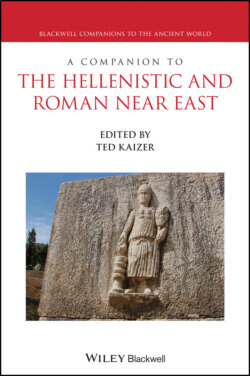Читать книгу A Companion to the Hellenistic and Roman Near East - Группа авторов - Страница 58
Jewish Hellenistic Writings in the Gentile World
ОглавлениеAlthough Egypt lies outside the scope of this survey, it must be mentioned here as the place where Jews produced translations into Greek of many of their sacred books. Beginning with the Books of the Law around 250 BCE, this process of translation continued in Egypt (and, in the case of some works, in the Land of Israel as well) until all the books of the current Hebrew Bible, and a number of other, “non-canonical” texts had been rendered into Greek. This collection of writings, commonly referred to as the Septuagint (abbreviated as LXX; see Schürer III.1 1973–87; Dines 2004; Rajak 2009) eventually came to form the Christian “Old Testament,” but its influence in the non-Jewish world before the advent of the Church has recently been more recognized and its influence reassessed (Barclay 1996; Rajak 2009). Certainly the existence in Greek translation of the Hebrew Torah bore witness to the non-Jewish, Greek-speaking world that the Jews were a clearly delineated ethnos who possessed their own distinctive and characteristic nomos, a clearly marked state constitution.
Thereafter, some Jews, writing in Greek, sought to demonstrate the high antiquity (and thus the nobility) of their Law and constitution, sometimes going so far as to suggest that the great Greek lawgivers, like Solon and Lycurgus, and the major philosophers Plato, Aristotle, and Zeno had derived their ideas and political philosophies from Moses. Such men as Aristobulos, Artapanus, and Eupolemus, whose writings survive only in fragmentary form, ensured awareness of Jewish intellectual activity among the Greek-speaking population, and provided the basis for further cultural interaction between Jew and Gentile. All of them, in their different ways, were engaged in attempts to “embed” Jews and their culture in the Hellenistic environment; and, in so doing, they “wrote Jews into” the wider ancient historical context made familiar to educated Greeks through the writings of Herodotus, and, in later times, the works of historiographers like Manetho and Berossos (for the latter, see Chapter 4). In the view of Aristobulos, Artapanus, Eupolemus, Demetrius the Chronographer, and many others, Jews and Greeks shared in the same world, and, whatever the distinctiveness of the Jews, au fond espoused common values (Holladay 1983–1995). The degree to which such convictions could influence Greek-speaking Jewish writers is well illustrated by the case of Ezekiel the Tragedian, who composed in iambic trimeter verse a play called Exagogē, dramatizing the story of Israel’s Exodus from Egypt (Jacobson 1982; Lanfranchi 2006).
